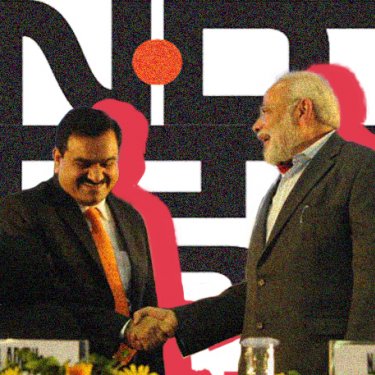NDTV takeover signals end of pluralism in India’s leading media

Reporters Without Borders (RSF) expresses concerns over the acquisition of India’s last major independent TV broadcaster, New Delhi Television (NDTV), by Gautam Adani, a billionaire businessman who openly supports Prime Minister Narendra Modi. This takeover, which has triggered the departure of many leading NDTV journalists, is not isolated. Media acquisitions by oligarchs are clearly endangering pluralistic public debate in India, RSF warns.
The latest of the many journalists to go is Nidhi Razdan, an anchor who used to be editor-in-chief of NDTV’s 24-hour news channel, NDTV 24x7. She announced her departure in a tweet yesterday (31 January). Three days before Razdan, it was NDTV star anchor Sreenivasan Jain who resigned publicly. He joined NDTV in 1995 and had hosted such leading shows as “Reality Check” and “Truth vs Hype” in the course of nearly three decades of loyal service.
Their departure followed the resignation, announced on 13 January, of another emblematic NDTV figure, Suparna Singh, who had been the group’s president for 20 years. Two other prominent members of the NDTV management, chief strategy officer Arijit Chatterjee and chief technology and product officer Arijit Chatterjee, quickly followed suit. Previously, in December, it was the NDTV group’s founders, former journalists Radhika and Prannoy Roy, who resigned from the management.
Ethical and pluralistic requirements
This flood of departures followed the acquisition of a nearly 65% stake in NDTV by Adani Group, the conglomerate that Gautam Adani, who is from Gujarat state, began building into Asia’s biggest fortune when Modi was Gujarat’s chief minister.
“This erosion of the forces that built NDTV’s journalistic reputation is intrinsically linked to its acquisition by Adani Group,” said Daniel Bastard, the head of RSF’s Asia-Pacific desk. “Gautam Adani's unconcealed proximity to India’s ruling party raises serious questions about respect for NDTV editorial independence. We ask him to issue clear and transparent guidelines to his staff so that NDTV journalists and executives are able to work freely and in complete accord with the ethical and pluralistic requirements expected of a media outlet.”
Subjective take on journalistic “courage”
In an interview for the Financial Times in November, before the NDTV takeover took effect, Adani expressed a very subjective take on journalistic “courage” and editorial independence.
“Independence means if the government has done something wrong, you say it’s wrong,” he said. “But at the same time, you should have courage when the government is doing the right thing every day. You have to also say that.”
Ravish Kumar, who as senior executive editor was NDTV’s “frontman”, quickly noticed the impact of the change after leaving the company that had employed him since 1996. “My programmes were boycotted [by representatives of the ruling Bharatiya Janata Party] but as soon as I left, second-rung BJP functionaries started showing up,” he told The Wire news website.
He predicted that Adani “will certainly not promote questioning or criticism of the government in any way” and concluded that “99.99999% of the Indian media praise the Modi government” and spend enormous sums “to spread falsehood and hatred.” These media include “Mr. Ambani’s channels,” he added, referring to India’s second richest businessman.
Oligarch takeovers
Mukesh Ambani is another classic example of the billionaire oligarch who “acquires” media outlets so that they promote particular policies. The chairman of Reliance Industries and personal friend of the prime minister, Ambani owns more than 70 media outlets that are followed by at least 800 million Indians.
Kumar may have exaggerated in his assessment of the Indian media landscape, but only slightly. As RSF revealed in a 2019 survey of media ownership in India, the level of concentration is all the more alarming because the leading media owners tend to be very close to ruling party representatives.
Financially independent of the leading conglomerates, NDTV was the exception in the Indian media landscape. The channel was respected for refusing to sacrifice standards in order to boost viewing figures or to hype sensational stories.
Maya Sharma, another long-time NDTV journalist who is now a consultant editor, told RSF: “NDTV was one of the very few media outlets that felt it could be critical of the administration. The people who have come in are so far saying there will be no major changes in the way NDTV produces news but that remains to be seen.”
Blurred lines
Kamala Thiagarajan, a freelance journalist who follows the Indian media landscape, has seen it all before. “Of course, there’s this clause that says the billionaires swallowing up media companies mustn’t interfere in editorial work but, in India, those lines are kind of blurred. In the end, these billionaires control the reporting that should be serving the public interest. It’s a very disturbing trend.”
The trend is all the more disturbing for being accompanied by an increase in cases of intimidation of journalists and censorship orchestrated by the government and ruling party. Last week, the government blocked viewing of a BBC India documentary, The Modi Question, on all online streaming outlets, while students at a Delhi university were even arrested on 25 January for trying to hold a screening.
